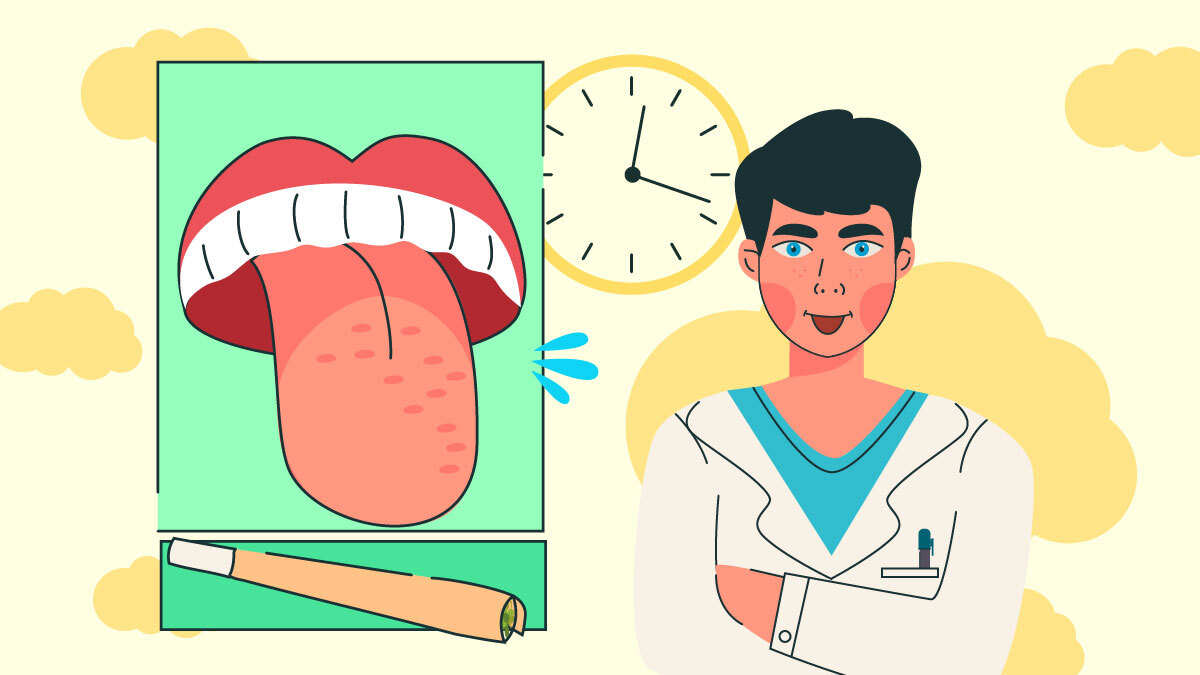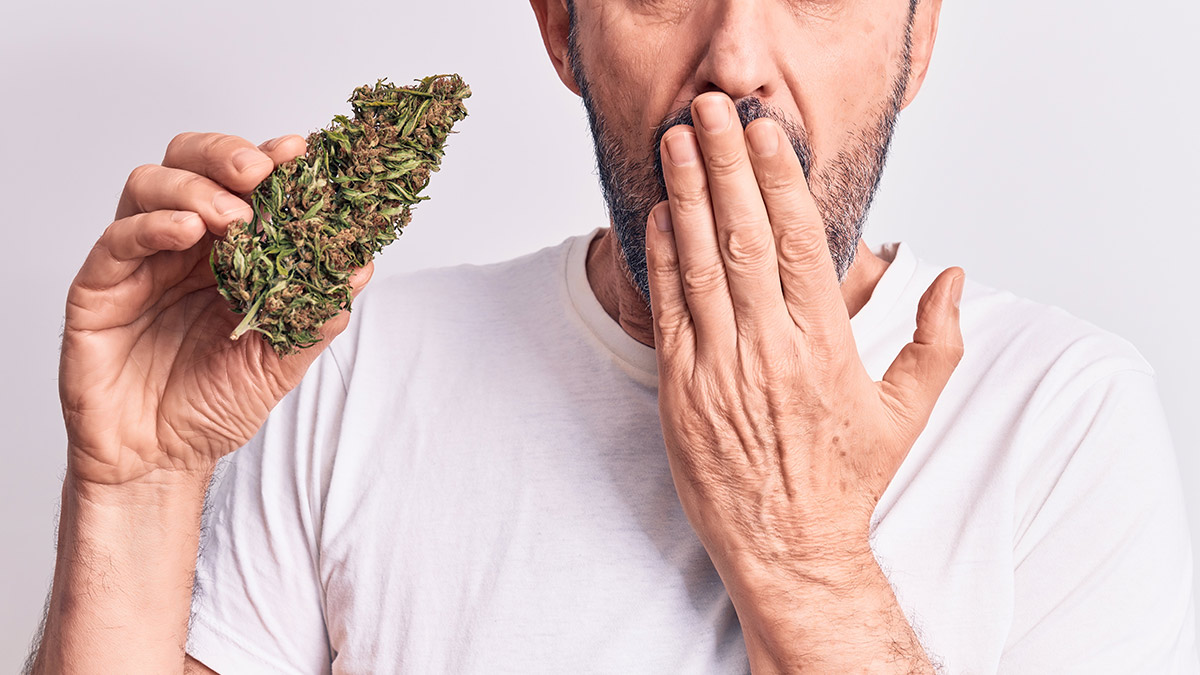How Long Does THC Stay In Your Saliva Glands?

You have to take a drug test and you’re a regular weed smoker?
For quite some time, conventional wisdom has said that you’re lucky if it’s going to be a saliva or blood test. Urine screening is much more common, and it may be able to detect cannabis use over the last month or even more. Hair tests, while not used often, can detect weed use for longer than that.
But according to that same conventional wisdom, saliva and blood tests can only detect traces of marijuana for hours, or at most, a few days. That’s the good news for those who are going to have their saliva tested.
Unfortunately, there’s also some bad news. There’s now been research showing that traces of THC can remain in saliva much longer than had previously been thought.
Let’s look at the details.
Saliva Testing vs. the Alternatives
(Needless to say, the common sense alternative is to say “Why bother testing? It’s only weed.” But that doesn’t help when your boss tells you you’re going to be dropped.)
The vast majority of employers depend on urine tests for their prospective or current employees.
There are two reasons why. One is that urine testing is less invasive and less expensive than testing blood or hair samples. The other is that urine and hair tests can detect previous cannabis use over weeks or even longer; it’s been commonly believed that blood and saliva tests only detect more recent use.
Why would testing windows be so different?
It’s simple, but let’s split the explanation into two parts:
- Only blood and saliva tests screen for THC, the psychoactive cannabinoid in weed. Urine and hair screenings don’t look for THC; they look for a related substance called THC-COOH.
- THC itself doesn’t stay in the body very long. Most of it is broken down in the liver to create what are called metabolites; THC-COOH is one of those metabolites. The remaining THC is quickly purged from the body in urine and feces. But THC-COOH is stored in body fat, and it remains there until the fat is burned.
So when a moderate user’s urine is checked for THC-COOH, it’s likely to show traces of the metabolite for 1-2 weeks. Frequent users will test positive for 3-4 weeks, and heavy users for a month or even longer. Hair grows so slowly that THC-COOH can often be detected for months.
Saliva and blood tests, however, look for THC, not THC-COOH. (To be fair, some blood tests now look for THC-COOH as well.) THC is eliminated quickly, so users only come up dirty on a saliva test if they’ve smoked up fairly recently.
That’s the big question. How recently?
Saliva Tests and THC Detection

First, a bit of background info. All drug tests have thresholds. In other words, they only register positive if a certain amount of a substance can be detected. That’s basically to prevent false positives.
After you smoke, THC binds to the endocannabinoid receptors in the salivary glands. When the glands produce saliva containing THC, it collects in the oral mucosal tissues; swab tests collect it from those tissues. It’s long been believed that meaningful amounts – levels that cross a drug test’s threshold – only remain in the mucosal tissues for hours. Perhaps a day or two, at most.
A 2002 study published in Forensic Science Review pegged the maximum detection window at 1-2 days. And a 2013 study looked deeper. Participants smoked a joint with about 7% THC content, and researchers then tested their saliva multiple times. All tested positive for weed during the first 13½ hours, and some tested positive for as long as 30 hours after smoking. (The participants went home after 30 hours.)
But there’s newer evidence that THC can stay in saliva a lot longer than that.
A more recent study used saliva tests to check cannabis smokers for THC and made two interesting discoveries. One was that the results of saliva tests didn’t follow a declining curve; that is, the amount of THC measured in their saliva went up and down over a period of days.
More importantly, traces of THC were detected in the saliva of some regular weed users for as many as eight days after they’d smoked. Even more ominous: a comprehensive research study concludes that THC may remain in the saliva of occasional smokers for as many as 72 hours, and as long as 30 days for regular, heavy smokers.
That means your weed buddies were wrong when they told you there was nothing to worry about if you were going to be given an oral drug test. You might get popped a month after you stopped smoking.
Is there anything you can do about it?
About Those “Ways to Test Negative”
Those same buddies who said you wouldn’t come up positive on a saliva test the day after you’d smoked? They probably had some ideas about how you could “be sure” the test would clear you.
Among the common suggestions you’ll often hear:
- Brush your teeth as much as possible before the test, flossing and using a tongue scraper as well.
- Use an antiseptic mouthwash right before the test; it supposedly alters saliva content for about half an hour.
- Chew a lot of gum ahead of time to stimulate saliva production and dilute its THC content, or suck sour candies to make your saliva more acidic and screw with the test results.
- Eat lots of fatty food the day before the test; THC binds to fat, so it will theoretically be “pulled out” of your saliva and excreted.
- Swish hydrogen peroxide around your mouth immediately before being tested; that supposedly works for about five minutes.
Sadly, we have more bad news. A research study has concluded that changing what you eat or drink, or brushing your teeth, won’t do much good in helping you test negative for weed on a saliva drug test. Neither will be drinking lots of water or exercising.
There was one small bright spot, though. Drinking beer an hour after smoking up appears to lower THC concentrations in saliva. Of course, if you’re also being tested for alcohol use, that might create an entirely new problem.
How Long Does THC Stay In Your Saliva Glands? FAQ
Q: Do cops use saliva tests if they stop you for DUI?
A: Not usually. They’re much more likely to look for physical signs of impairment like dilated pupils or red eyes or to conduct field sobriety tests. If they arrest you for being under the influence, it’s most likely they’ll conduct a blood test (if you consent). We have a little more bad news, though; rapid THC saliva tests that are fast and accurate have been developed by several companies, and they may be appearing at roadside stops in the near future.
Q: Are there any other factors that might affect whether I test positive on a saliva test?
A: There are several. The most important ones are how much/how often you’ve smoked, and how much THC was in the weed. But some people metabolize and eliminate THC faster than others; their level of body fat, their overall THC tolerance, the speed of their body’s metabolism, and their genetics all play a role in how quickly traces of THC will disappear.
References
- Sharma, P., Murthy, P., & Bharath, M. S. (2012). Chemistry, metabolism, and toxicology of cannabis: clinical implications. Iranian Journal of Psychiatry, 7(4), 149. [1]
- Huestis, M. A. (2002). Cannabis(Marijuana)- Effects on Human Behavior and Performance. Forensic Science Review, 14(1), 15-60.
- Anizan, S., Milman, G., Desrosiers, N., Barnes, A. J., Gorelick, D. A., & Huestis, M. A. (2013). Oral fluid cannabinoid concentrations following controlled smoked cannabis in chronic frequent and occasional smokers. Analytical and bioanalytical chemistry, 405(26), 8451-8461. [3]
- Andås, H. T., Krabseth, H. M., Enger, A., Marcussen, B. N., Haneborg, A. M., Christophersen, A. S., … & Øiestad, E. L. (2014). Detection time for THC in oral fluid after frequent cannabis smoking. Therapeutic drug monitoring, 36(6), 808-814. [4]
- Lee, D., & Huestis, M. A. (2014). Current knowledge on cannabinoids in oral fluid. Drug testing and analysis, 6(1-2), 88-111. [5]
- Drummer, O. H. (2006). Drug testing in oral fluid. Clinical Biochemist Reviews, 27(3), 147. [6]